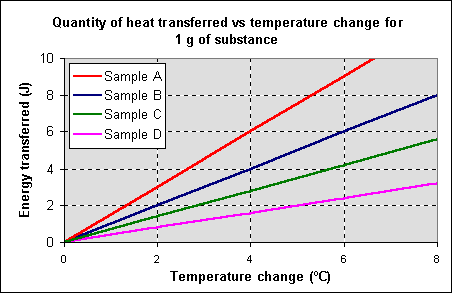

1) Which of these substances has the highest specific heat?
(a) Sample A
(b) Sample B
(c) Sample C
(d) Sample D
2) 125 g of water (c = 4.184 J/g°C), 125 g of ethanol (c = 2.46 J/g°C), 125 g of carbon tetrachloride (c = 0.861 J/g°C), and 125 g of ethylene glycol (c = 2.42 J/g°C) at 50°C were each placed into a calorimeter and the temperature recorded. The temperature of the surroundings was 20°C. After one hour the temperature of which substance would have changed by the largest amount? Assume that the rate of heat transfer from the calorimeter to the surroundings was the same in each case.
(a) water
(b) ethanol
(c) ethylene glycol
(d) carbon tetrachloride

3) Which of these substances has the lowest specific heat?
(a) Sample A
(b) Sample B
(c) Sample C
(d) Sample D
4) 125 g of water (c = 4.184 J/g°C), 125 g of ethanol (c = 2.46 J/g°C), 125 g of carbon tetrachloride (c = 0.861 J/g°C), and 125 g of ethylene glycol (c = 2.42 J/g°C) at 50°C were each placed into a calorimeter and the temperature recorded. The temperature of the surroundings was 20°C. After one hour the temperature of which substance would have changed by the smallest amount? Assume that the rate of heat transfer from the calorimeter to the surroundings was the same in each case.
(a) water
(b) ethanol
(c) ethylene glycol
(d) carbon tetrachloride

5) How much energy needs to be transferred to 15 g of
Sample A
to raise its temperature from 20.°C to 24°C?
(a) 6 J
(b) 90 J
(c) 180 J
(d) 360 J
6) 1.0 mol of water (c = 4.184 J/g°C), 1.0 mole of ethanol (c = 2.46 J/g°C), 1.0 mole of carbon tetrachloride (c = 0.861 J/g°C), and 1.0 mole of ethylene glycol (c = 2.42 J/g°C) at 50°C were each placed into a separate calorimeter and the temperature recorded. The temperature of the surroundings was 20°C. After 1 hour the temperature of which substance would have changed by the smallest amount? Assume the rate of heat transfer from the calorimeter to the surroundings is the same in each case.
(a) water
(b) ethanol
(c) ethylene glycol
(d) carbon tetrachloride

7) How much energy needs to be transferred to 5 g of Sample
B
to raise its temperature from 7°C to 13°C?
(a) 30 J
(b) 6 J
(c) 90 J
(d) 180 J
8) 1.0 mol of water (c = 4.184 J/g°C), 1.0 mole of ethanol (c = 2.46 J/g°C), 1.0 mole of carbon tetrachloride (c = 0.861 J/g°C), and 1.0 mole of ethylene glycol (c = 2.42 J/g°C) at 50°C were each placed into a separate calorimeter and the temperature recorded. The temperature of the surroundings was 20°C. After 1 hour the temperature of which substance would have changed by the largest amount? Assume the rate of heat transfer from the calorimeter to the surroundings was the same in each case.
(a) water
(b) ethanol
(c) ethylene glycol
(d) carbon tetrachloride